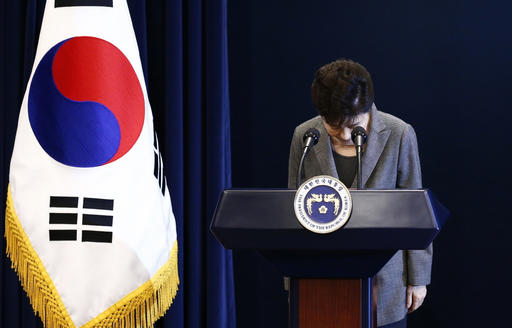
In this Nov. 29, 2016, file photo, South Korean President Park Geun-hye bows during her address to the nation while saying she’ll resign if parliament comes up with a plan for the safe transfer of power, at the presidential Blue House in Seoul. South Korea. Park, who faces impeachment, rose to power with the support of conservatives enamored of the growth ushered in by her late dictator father decades ago, but her four years in office have been marred by controversy. AP FILE PHOTO
SEOUL, South Korea – South Korean President Park Geun-Hye woke Friday to what could effectively be her final day in office, with parliament set to vote on an impeachment motion triggered by a devastating political scandal.
If the motion is adopted, it would result in the immediate suspension of Park’s substantial executive powers and their transfer to her prime minister.
She would be allowed to retain her title, pending a ruling by the Constitutional Court which has up to six months to decide whether or not to ratify the impeachment and formally end her presidency.
Whichever way the vote goes, it has been a startling fall from grace for a politician who had run for the presidential Blue House as an incorruptible candidate, declaring herself beholden to nobody and “married to the nation”.
Now she faces the ignominy of going down in history as the first democratically-elected South Korean president to be booted out of office.
The opposition-sponsored impeachment motion accuses Park of constitutional and criminal violations ranging from a failure to protect people’s lives to bribery and abuse of power.
It was filed last week with the 171 signatures of all opposition and independent lawmakers – leaving it 29 short of the two-thirds majority needed to clear the 300-seat chamber.
READ: South Korea’s parliament sets up presidential impeachment vote
Rebel support
Its passage will depend on the backing of an anti-Park faction within the Saenuri party – more than 30 MPs who have shifted position several times but now look set to back Park’s ouster.
The push for impeachment has been driven by massive protests that have seen millions take to the streets of Seoul and other cities in recent weeks, demanding that political parties remove Park if she refuses to step down.
The scandal that has engulfed Park and paralyzed her administration has focused on her friendship with long-time confidante Choi Soon-Sil.
Choi has been charged with meddling in state affairs and using her Blue House connections to force dozens of conglomerates to donate around $70 million to two foundations she controlled.
In a first for a sitting South Korean president, Park has been named a “suspect” by prosecutors investigating the case.
High-level corruption has long been a stain on South Korea’s democratic credentials and the presidential Blue House is no stranger to allegations of cronyism.
Since South Korea’s first free and fair election in 1987, every president has faced graft investigations after leaving office and one – Roh Moo-Hyun – committed suicide as a corruption probe closed in on his family.
Their cases often involved family members who were able to leverage links to the president in a society where political influence has traditionally had a very close and unhealthy rapport with business success.
Shattered image
Park, the daughter of military strongman Park Chung-Hee who led the country from 1961 to 1979, was meant to be different.
Both her parents were assassinated and, estranged from her two siblings, unmarried and childless, she promoted herself as invulnerable to nepotism.
“I have no family to look after nor children to inherit my property … I want to devote myself to the nation and the people,” she said in a speech during the 2012 presidential campaign.
The image of duty and self-sacrifice played well with the conservative base of her ruling Saenuri Party, especially older voters who saw her as a virtuous survivor of personal tragedy.
READ: A look at the rise and fall of South Korea’s president
All the more shocking then were the revelations of the extraordinary influence Choi wielded over the president – from selecting her wardrobe to vetting the appointment of top officials.
Park also faces allegations that she leaked confidential documents to Choi, who holds no official position./rga